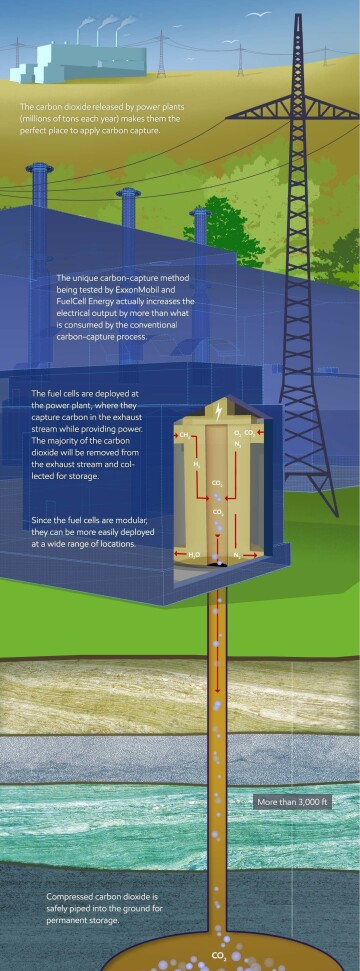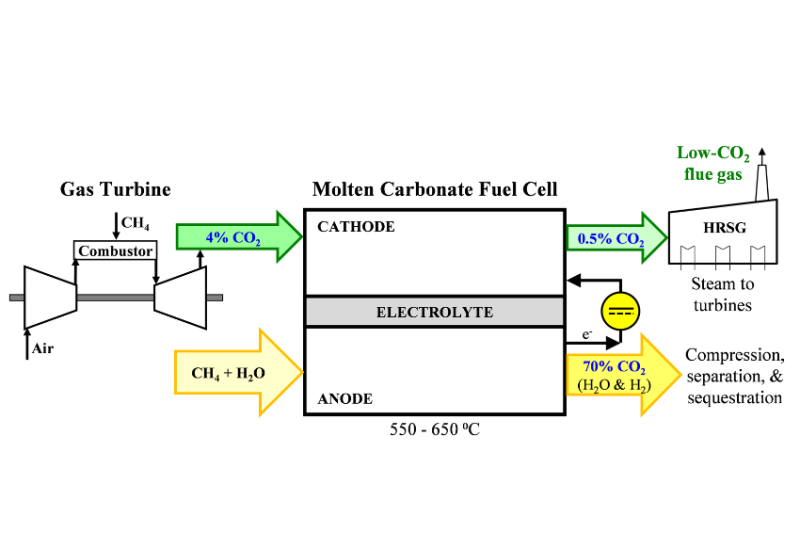ExxonMobil Technology and Engineering Co. and Connecticut-based FuelCell Energy Inc. are extending their joint development agreement (JDA) to accelerate commercialization of a novel molten carbonate fuel cell (MCFC) design that can capture industrial CO2 emissions while generating electricity and hydrogen.
The updated agreement which now extends through 31 December 2026 will enable FuelCell Energy to market its original CO2 technologies along with a modified version of designs enhanced with innovations developed jointly with ExxonMobil, FuelCell Energy announced on 8 April.
Such an approach will enable the technology to be delivered more quickly to market while the next-generation fuel cell and module design is demonstrated at Esso Nederland BV’s Rotterdam Manufacturing Complex.
The pilot in Rotterdam features an optimized design for large-scale installations which captures carbon while simultaneously generating electricity and hydrogen, thus improving the economics of carbon capture more attractive to gas-fired power plant operators.
ExxonMobil and FuelCell Energy teamed up in 2016 to focus specifically on global-scale carbon and capture with MCFC for gas-fired and coal-fired plants.
“Two years of comprehensive laboratory tests have demonstrated that the unique integration of two existing technologies—carbonate fuel cells and natural gas-fired power generation—captures CO2 more efficiently than existing scrubber conventional capture technology. The potential breakthrough comes from an increase in electrical output using the fuel cells, which generate power, compared to a nearly equivalent decrease in electricity using conventional technology,” the company said in a 5 May 2016 announcing the agreement.
Jason Few, CEO and president of FuelCell Energy, said in 8 April news release, “Through this updated agreement, we can move more quickly to provide access to this superior technology in our existing platform targeting small to mid-scale opportunities while we demonstrate large-scale carbon capture at Esso’s refinery in Rotterdam.
FuelCell Energy is currently manufacturing modules at its Torrington, Connecticut, manufacturing facility for the Rotterdam demonstration plant.
The European Union under the Emissions Trading System Innovation Fund and the Netherlands Enterprise Agency are co-funding the pilot under a Demonstration Energy and Climate Innovation grant.

Commercial Framework To Be Outlined
Along with the JDA extension, FuelCell Energy and ExxonMobil plan to negotiate a commercial framework to best deploy their carbonate fuel cell technology for carbon capture.
The technology directs CO2-containing flue streams, such as combustion exhaust, to the fuel cell, where electrochemical reactions produce electricity and hydrogen, while capturing and concentrating CO2 for utilization or permanent sequestration and destroying nitrogen oxides (NOx).
Other carbon capture technologies consume energy from the host plant, grid, or onsite generation, and thus are inefficient.
FuelCell Energy holds 531 fuel cell technology patents in the US and globally, according to the company.
For Further Reading
SPE 197377 CO2 Capture From Natural Gas Combined Cycle Power Generation Using Carbonate Fuel Cells by G. Kiss, T. Barckholtz, G. Blanco Gutierrez, and F. Rodrigo, ExxonMobil Research and Engineering Co., et al.


